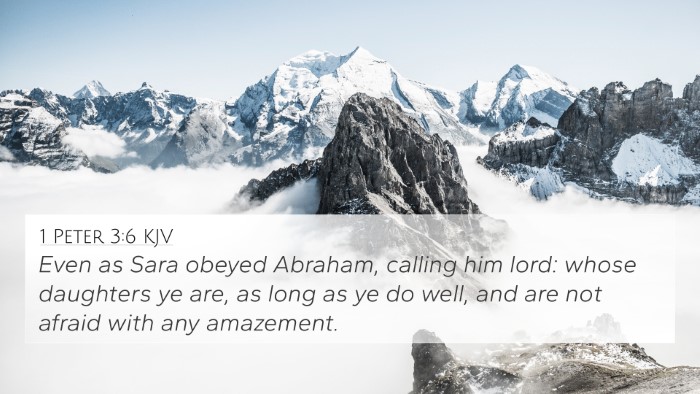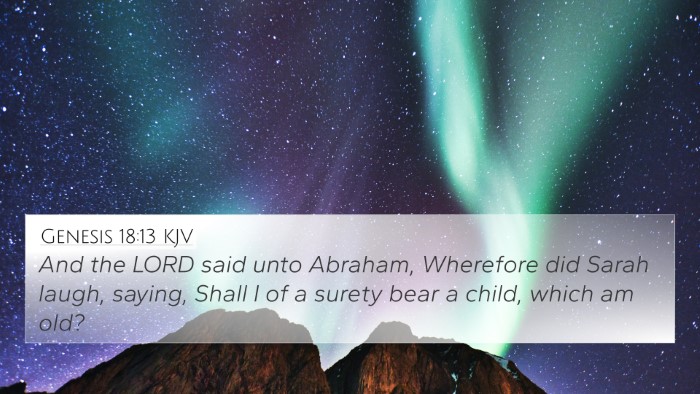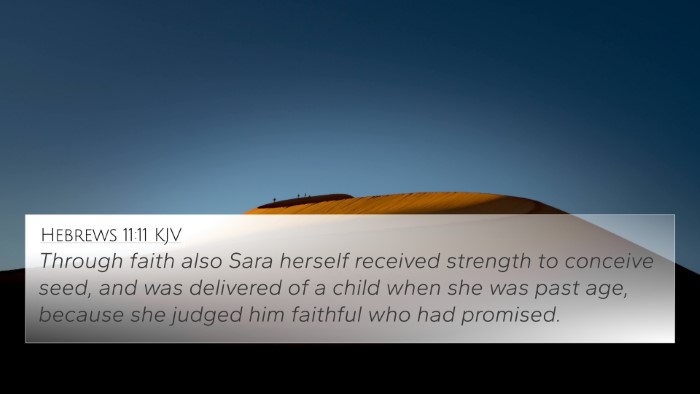Understanding Genesis 18:12
Genesis 18:12 states: “Therefore Sarah laughed within herself, saying, After I am waxed old shall I have pleasure, my lord being old also?” This verse encapsulates a moment of disbelief and the human condition when faced with divine promises. Through insights drawn from public domain commentaries, we explore its deeper meanings and connections to other Biblical texts.
Context and Overview
This verse occurs during a visit by three angels to Abraham, where they deliver the shocking news of Sarah bearing a child despite her advanced age. The laughter of Sarah signifies a mix of skepticism and incredulity at the promise of God. Commentators have observed that this laughter reflects a universal human response to extraordinary claims.
Commentary Insights
-
Matthew Henry:
Henry discusses how the laughter of Sarah stems from a moment of doubt. He emphasizes that even individuals of great faith can struggle to trust God's promises when faced with overwhelming circumstances. The context of their age and the barrenness of her womb highlights the miraculous nature of God's promises.
-
Albert Barnes:
Barnes notes that Sarah's reaction indicates a lack of faith. He stresses the importance of recognizing God's power, which transcends human limitation. He suggests that this moment serves as a reminder of God’s sovereignty over time and circumstances, urging believers to trust in His word.
-
Adam Clarke:
Clarke elaborates on the psychological aspect of Sarah's laughter, interpreting it as an internal struggle between hope and doubt. He provides a classical perspective by associating Sarah’s experience with the broader theme of faith overcoming fear, urging readers to reflect on the significance of belief in the face of impossible odds.
Thematic Connections
Genesis 18:12 fits within broader Biblical themes such as faith, divine promise, and the human response to God’s word. This verse has numerous connections to other scriptures that echo similar sentiments of doubt and the need for faith.
Related Bible Verse Cross-References
- Hebrews 11:11: “Through faith also Sarah herself received strength to conceive seed.” This verse highlights Sarah’s eventual faith, connecting to her initial skepticism.
- Genesis 21:6: “And Sarah said, God hath made me to laugh, so that all that hear will laugh with me.” This demonstrates the transformation from doubt to joy upon witnessing God’s promise fulfilled.
- Romans 4:19-20: Referring to Abraham’s faith, it contextualizes the challenge of believing in God’s promises despite overwhelming evidence to the contrary.
- Luke 1:37: “For with God nothing shall be impossible.” This echoes the core message of Genesis 18:12, emphasizing divine omnipotence.
- Mark 9:23: Jesus states, "If thou canst believe, all things are possible to him that believeth,” which underscores the importance of faith.
- Isaiah 46:10: “Declaring the end from the beginning, and from ancient times the things that are not yet done.” This reaffirms God's sovereign plan and timing.
- John 15:5: “Without me ye can do nothing.” This emphasizes the necessity of divine support in believing for the impossible.
- Philippians 4:19: “But my God shall supply all your need according to his riches in glory.” This relates to God meeting needs against all odds.
- Psalms 127:3: “Lo, children are an heritage of the Lord: and the fruit of the womb is his reward.” This reflects the value of divine blessing in procreation.
- Galatians 4:27: “For it is written, Rejoice, thou barren that bearest not.” This relates to Sarah’s eventual transition from barrenness to motherhood.
Conclusion
Genesis 18:12 serves as a pivotal verse in understanding the complexities of faith and human doubt in the face of divine promises. By leveraging insights from classic commentaries and noting thematic connections within the Scriptures, we deepen our understanding of this significant moment in biblical history.
Exploring Bible Cross-References
For those wishing to delve deeper into the connections between Bible verses, tools for Bible cross-referencing, such as a good Bible concordance or study guide, can be invaluable. These resources help enrich one’s study and understanding of scriptural themes and promises.
Identifying connections between Old and New Testament texts, or conducting a detailed cross-reference between Gospels, enhances theological insight. Techniques for cross-referencing Bible study methods can reveal layers of meaning that often connect seemingly disparate verses.
Utilizing Cross-Referenced Themes
For effective sermon preparation or individual study, exploring Bible verses related to specific themes, such as faith, promise, or doubt, can illuminate the rich tapestry of God’s word. The Bible's interconnectedness is a powerful testament to the unified message of hope and redemption throughout scripture.











